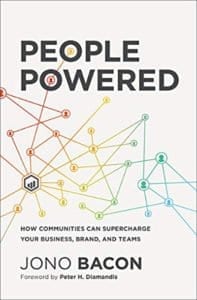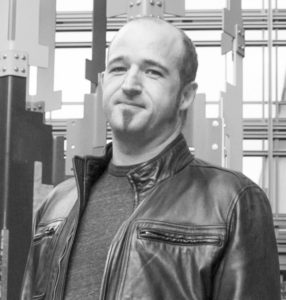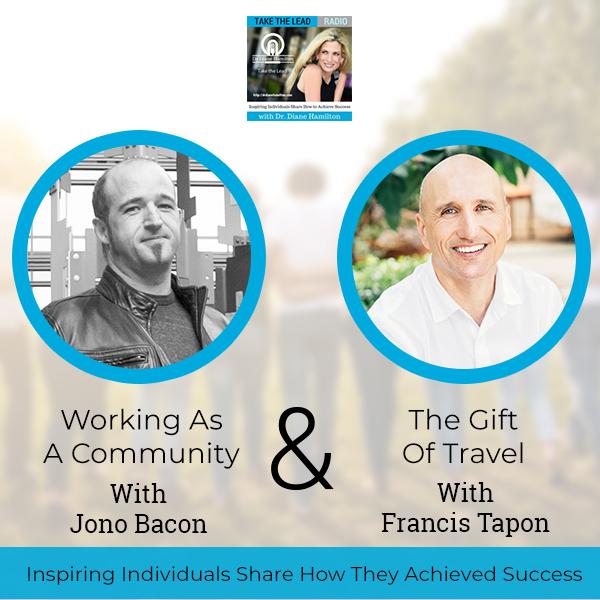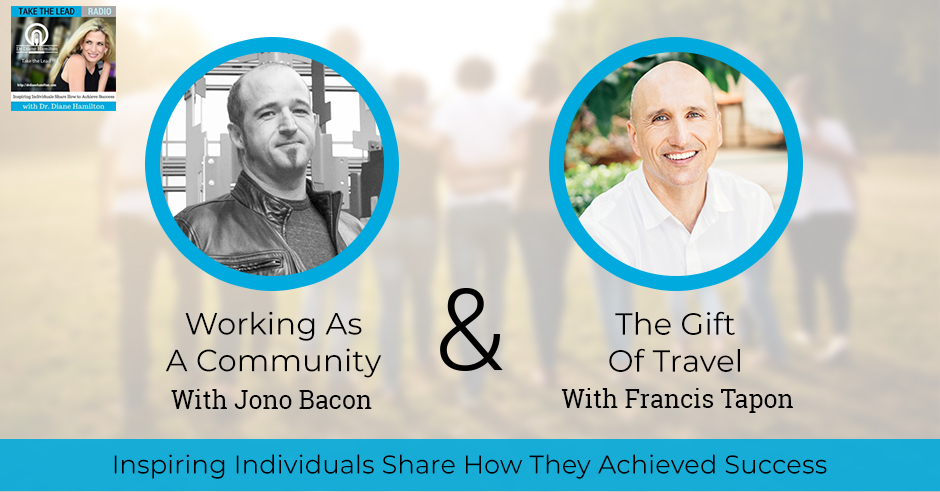As individuals, humans are infinitely powerful once their minds are set to it. But working as a community is a whole different ball game because there is so much to consider. Jono Bacon, the Founder of Jono Bacon Consulting, gets down to brass tacks about the importance of finding a way to work as a community, because you get to harness the power of infinity multiplied. Struggling to lead or work with a group beyond yourself? Let this be your beginning!
Travel is often seen as a luxury, and in most ways, it is, but what you can potentially get out of travel is absolutely unexpendable and something no one can ever take away from you. Prolific world traveler Francis Tapon sits down with Dr. Diane Hamilton to talk about the ways in which travel can enrich you, and how to start traveling on a budget. Francis shows that travel, at the end of the day, is for everyone.
I’m glad you joined us because we have Jono Bacon and Francis Tapon here. Jono is the community and collaboration strategy consultant, speaker and author of People Powered. Francis is a nomad, author and speaker. He’s doing interesting things across all kinds of content. Between Jono and Francis, we’re going to have an interesting conversation.
Listen to the podcast here
Working As A Community With Jono Bacon
I am here with Jono Bacon who is a leading community and collaboration speaker, author and podcaster. He’s the Founder of Jono Bacon Consulting, which provides community strategy, execution, workflow and other services. He’s also the author of People Powered: How Communities Can Supercharge Your Business, Brand and Teams, as well as other books. You’ve written The Art of Community. You’re a columnist for Forbes and so much more. Welcome, Jono.
It’s great to be here, Diane. Thank you.
This is going to be fun and you are welcome. First of all, where are you from?
I’m an English man who’s been living in America for several years. I’m originally from all over the UK. I was born in the north, raised in the south and went to a university in the Midlands, but I moved to California several years ago. I’ve got that weird English person starting to sound American accent.
You live in San Francisco now. It’s definitely an attractive accent. I read that you were born in Northallerton in England. San Francisco is now the place to be. My daughter lives in San Jose, so I get up there quite a bit. There are a lot of people who are interested in communities up there. I can see why your book would be perfectly timed. What are you writing about in People Powered?
Essentially, one of the things that have been interesting in typically many years is that the relationship between people and the companies that we do business with or the projects and the campaigns that we care about is changing. Years ago, for example, you went and bought a product from a company and you’d only engage with them through their customer support line or through an email address or something along those lines. The advent of cell phones and internet access has changed all of that. Companies originally started when the internet started being born, but broadcasting out to their customers, sending the newsletters, marketing materials and things like that. As we’re entering into an era with social technology that’s around, normal people care about getting together into communities and collaborating together.
Your customers are not consuming and buying your products. What they’re doing is they’re working with other customers and collaborating together to do interesting things. To give you an example, Salesforce, Oracle, SAP, they’ve all built communities of over a million members where people get together to promote your brands. They provide customer support and guidance, produce content and organize events. In Harley Davidson, the setup of the 1,700 local chapters around the world that people get together to talk about their bikes. We’ve seen an enormous growth of technology and open source and elsewhere where the technology that’s running the internet, for example, is built by people who collaborate together around the world.
Essentially, what People Powered is all about walking through this value of gluing the people who are your audience together, this network of minds and how do you build a strategy that pulls the best from them into a community and generates results for your organization? I’m certainly of the view that this is going to be the future of business because Millennials, for example, are growing up in a world with cell phones in their pockets. They’re familiar with social technology. There’s already reporting out there about changing perspectives in the workplace, for example. This is going to be more and more of a need for consumers as we stepped into the next decade.
[bctt tweet=”The advent of cellphones and internet access has changed people’s relationship with companies.” username=””]Is this interesting to see the change? I noticed a couple of the boards that I’ve been serving on had focused more on that type of thing. I work with Flerish, but it’s an app that’s been sponsored with the work based on Reid Hoffman, the guy who created LinkedIn. His work, his books and they’re working on developing communities within the working world in that respect. Another group I’ve worked with, Global Mentoring Network, was a brainchild of Keith Krach from DocuSign. Both of these are focused on the power of tying into what other people can help you do, mentorship. I could see that this is going to be the future and people need a handbook to understand how to do this. That’s what you’re doing. You’re telling them about how these communities can supercharge their business.
The other thing as well, to touch on this, it’s tricky because it’s this odd mixture of understanding the psychology of why people join into groups and the psychology of how people work together. How do you organize all of that? How do you use the right technology and systems? All that stuff is difficult. That’s why we’ve seen many success stories. You never hear about the failures. My goal with People Powered is to convert all of those values into something that’s practically useful.
You bring up collaboration. It’s an important thing to talk about. I was lucky to have Amy Edmondson on the show and she had a great TED Talk about the Chilean miners and how they were able to get them out because they were able to use curiosity to collaborate. Since I’ve written about curiosity, I was interested in that discussion. I’m curious where curiosity plays in all of this, in how people work together, play nice and find each other?
One of the things that’s interesting here, I’m a firm believer that if you take away the computers, the screens, the cars, the cell phones, it’s important for us to remember that we are animals. As animals, we have this core set of needs and fears and other psychological components. One of the reasons why communities work well and why we’ve seen many examples of them working across different industries and sectors, both inside the companies and outside of the companies, is because of the cap into a core human need for a social environment, collaboration and doing meaningful work. One key element of that curiosity is that we’re a curious species. We’re interested in discovering more and building skills. This is why the internet has been successful is because it’s provided this unlimited library of information and guidance.
In the earlier days, it was text files on the internet and people are learning things through YouTube videos. One such example of this is the open-source world in the technology world where you can download a piece of software and you can improve it by contributing the project in the community. The value of that is not the fact that you can get the code for free and you can contribute to it. Part of the value is that you can work with other people where they can review your work and they can provide input. You get this powerful feedback loop that taps into some of those core human sensibilities around curiosity and doing what gets called meaning and investing in something that is a shared benefit for everybody. This is where the topic is historically being quite complicated because years ago, when I got into anything, if you read anything on community, it was all social science stuff.
It was all academic writing about the psychology of how people spend time together. My view was I’m not interested in that. I’m interested in delivering something of value that we can get up and running. That is part of the goal with the book is to try and weave these things together. To set expectations for your audience, this is a big subject. We’re only starting to scratch the surface of what’s possible here. There are many examples of communities in action but every year, there are brand new examples coming out. One such example is HITRECORD by Joseph Gordon-Levitt, who’s an award-winning actor. He contributes some content to People Powered. He built a community of artists who come together to work on videos and projects together. Someone will do the writing, someone will make the music, someone will film the green screens and will produce the imagery that goes on the green screen. That was another different example of people coming together. This is a core human recipe that’s non-assessing in lots of different ways.

People Powered: How Communities Can Supercharge Your Business, Brand, and Teams
I interviewed Jos de Blok who is getting a lot of attention in Europe for bringing nurses together and reinventing the medical practices. There are many different things you can do. Many different industries, many ways of what we considered a community before is different now. As you were saying, all those people still got together to do things, but maybe they’re joining together in a different way now than they ever did. You work with some big names. I was looking at some of your consultancy, your communities and things. How did you get such big customers that you work with? Where did you begin with all this?
The origin story you could say is I discovered this nascent open source technology community back in 1998. I would have to bake it by the idea of people coming together to build software together on the internet. I started contributing there. I’ll skip through all of the boring histories, but basically joined a few companies and built a large community around Ubuntu, which is an operating system that runs much of the cloud. I went on to XPRIZE and went on to GitHub. Throughout this time, I was always excited about this challenge of understanding the nuance of how all of this fits together. This cocktail is psychology, workflow, incentives and all of these pieces.
Companies would reach out to me about how to do this because they’ve seen some of my previous work. I wrote The Art of Community, which is now the book. I didn’t plan to be a consultant. I started consulting on the side because people were interested in applying the principles in The Art of Community into their businesses. The tricky thing was that The Art of Community when I wrote that is a technical book. It’s designed for the community manager on the ground, rolling their sleeves up and doing all the work. It’s not a very strategic book. It doesn’t walk through how you build out a community strategy and spread it throughout your organization so you can execute as a whole. That’s the focus of People Powered. It was one thing leading to another.
I have a devastating short attention span. I was always interested in working with other people and learning new areas. I remember when I left Canonical in 2014, I’d been there for a few years working on Ubuntu. I had this realization that we can apply these principles to philanthropy. We can apply these principles to music, to film. We can apply them to publishing. We can apply them to all kinds of different areas. I wanted to soak myself in all of those challenges so I could learn more.
You mentioned all these things you’re doing and have done. It makes me wonder how you got into podcasting. Two million-plus downloads are a lot for a podcast. I’ve got to give you credit. I know how hard that is. Do you still do that?
Yeah, I do. It’s changed a bit over the years. When I first got into this Linux operating system in 1998, I went to a university in Wolverhampton and I started a Linux user group, which was a group of nerds sitting in a pub eating curry and drinking lots of lager on an evening. There were 3 or 4 personalities in that group that were always fun to be around. We basically took those four personalities. We started recording episodes on the internet. It wasn’t called podcasting back in 2004, but we started doing this. We were technically aware enough to be able to be self-sufficient to record it, put it on the internet, make a website and all the rest of it.
It became this weird cult thing in the UK. We used to do live shows that people would come to. We did a live show in the US. It catalyzed a lot of people who are interested in that technology back then. This was the early days in opensource. It was pretty insane. It was an irreverent show. We’ve all grown up since those days. One of the members of that group, Stuart Langridge, is my best friend. Another friend of ours, Jeremy Garcia, we do a podcast. It’s a more grownup version of that previous phone call, Bad Voltage. I do my own podcast called Conversations with Bacon where it’s similar to this. We have phone conversations with interesting people.
[bctt tweet=”The biggest challenge that most companies face is setting the right cultural lines up in a business.” username=””]A lot of is timing when people get into things. When you’re talking about Linux, I interviewed Richard Stallman, who was fascinating. The open-source thing where people are sharing and all the things that you’re talking about, you obviously got in very early to that thinking. I could see how the community would be a natural way that your brain would head. It’s going to be such a big thing as you said. There are going to be pitfalls in anything you do. What are the biggest issues that you’re finding that people are having the hardest times with this?
It breaks into a couple of different areas. The biggest challenge that most companies face when doing this work is it requires setting the right cultural lines up in your business. It’s a typical business if you look at it. You make your decisions in the organization. They’re written down in plans and you execute on them. The team leads who are responsible for different parts of those plans. When you build a community, there’s a certain element of opening up the tent to all the people coming in. You define how much control do we give the community and where we draw the line. The communities that thrive the most, how they’re engaging and frank relationship with the company.
A good example of this is one I mentioned in the book. They make musical equipment. They build the products and the community has no say in what they put into their products and how they run their business. They’ve got this incredibly passionate group of customers out there who produce books, documentation and videos. They’d beat to test their products and all kinds of different things. They’ve got a very healthy community there, but the lines are very clearly drawn in the sand about where the power begins and ends. You’ve got other projects such as Kubernetes which is a platform for running the cloud where everybody’s effectively equal there. If you do good work there, you earn a spot in the community. There’s a lot of consideration there around, how is that governed and what does the workflow look like?
Different communities operate in different ways. A lot of businesses don’t know where to draw the line for that specific area. That’s one element. Either element to be frank with you is not an issue with communities. It’s that too many businesses make plans and don’t follow through on them. It’s amazing to me how much work effort goes into planning. There isn’t enough accountability on executing and delivering that plan. I had a call with a client of mine. It was the conversation that we had like, “We’ve got the plan. What do we need to do to make sure the plan gets done? We can be focused on that success.” These are in many ways typical business challenges. Part of the fun for me is figuring out how to translate this weird community world where there’s proven value into the rigor, the structure and the terminology of how business operates. There’s much we can do about.
You bring up an interesting point because I’ve had more meetings to plan the plan and nothing ever gets done. We’ll talk about it but nothing happens other than the actual phone conversations. They would put you on all these committees and nothing ever happened. I’ve never understood that. Why are they having so many meetings to talk about more meetings? How do you get people not to do that?
As a consultant, I’ve fired 4 or 5 clients where I’ve said, “I know you’re happy to pay me, but I’m not having to take your money because we’re not making enough progress.” As a consultant, you have influence, but you have no power. I can only provide the right information, but it’s up to them to do the work. I’m not willing to waste my life having the same conversation over and over again.
Why do they consult if they don’t want to follow through? I’m always interested in how they get the consultants. There’s a problem where you wouldn’t go out to look for a consultant.
One of the things that a friend of mine, Liz, who’s an executive coach, she describes it as some days you need to be Gordon Ramsay and some days you need to be Gandhi. You play an equal role in holding them accountable as well as providing support and guidance. There’s an insurance policy. It was almost like a therapist role and with some clients around half of it. What’s exciting here is if you take a business and let’s say you’ve got 500 customers, there’s much wrapped up in the minds of those customers. They’ve got time. They’ve got skills. If you channel it correctly, they can send into an army of people that can generate material and brand recognition, all these things for you.
In the same way, if you’ve got 500 people working in your business, there’s much potential in helping all of that expertise and insight bubble to the surface in an organized way. That to me, is what’s exciting about this is you can only hire many people because you’ve got a budget, but there’s no budget or limitation on the size of your customer base or your community base. You could build it into thousands and thousands of people. That’s what Salesforce has done. They figured out a recipe for how to build a community over one million people where they feel proud of that journey.

Working As A Community: As essentially animals, humans have this core set of needs and fears and other psychological components.
Phil Komarny was on the show from Salesforce. They do some interesting things there. It’s important to be able to build these communities. Can you have a community without using a software platform like that?
Yeah. The way I tend to think of it is there are basically three types of communities in the world. One is what I referred to as consumers. These are people who get together because they have a shared interest, a shared passion. It can be people who sit in the same room, in a church, in a meeting circle or it can be people online on a forum to a fund starter, for example. They don’t change the thing that brings you together. The Star Trek fans don’t have much of an influence in Star Trek itself, but they’re excited to share that interest with each other and get better through this. The second type of model is champions where people produce material to support the success of the community. They create videos. They create documentation. They do advocacy. They organize events and things such as that.
The third is to collaborate where people come together to work on the same projects. It’s people building software, people creating art, whatever it might be. Every community has the same psychological underpinnings that go through it because we’re all human in every type of community. The tools and the workflow that you use for each is quite different. The consumers are usually dead simple. It’s providing a clubhouse where people can spend time and that might be a room every week where you meet together or it could be a forum. It could be a Slack channel, it doesn’t matter.
There are lots of detail in each of those. It’s about bringing people together. With the champions, it’s more about them providing a way to amplify the work that people are doing in your community such as promoting on a blog or publishing videos to the internet or having a place where people can find events. With the collaboration community, that’s where it gets more complicated. It’s one of the workflow of how we work together in the same way that in a business, you’ll have tools for your project management and for online discussions, in-person discussion, meeting schedules, you need a lot of that for the collaboration community. Part of this is understanding, “What community do I need?” In many cases, businesses have different multiple communities. I work with a lot of businesses where we’ll have an executive community for the executive customers and maybe a community for the people who are implementing or utilizing the product more broadly. It varies.
How do you keep these communities healthy, not have backbiting problems that they can turn toxic? I’ve seen that happen.
There are a few threads to this. From health in terms of good civil communications angle, there are two pieces that need to happen. First of all, setting expectations. We’ve seen a real movement in years around Codes of Conduct. Focusing attention on diversity and inclusion and things like that, which is important. Idiots don’t read Code of Conduct that sets the expectation. What you then need is a culture that focuses on civil discussion and constructive conversation and makes negatives, offensive, inappropriate conversation, socially inappropriate. The way in which you do that is through frankly the ways in which you uphold the norms of that culture. One element of that is having good leadership.
There’s a psychological passing called mimicry, which is where we tend to copy the behaviors of people who we respect or people who are in leadership positions. You have great leaders who are civil, who are collaborative, who ran well to failure. Your community members will tend to mirror that or your employees will tend to mirror that. Similarly, if you have negative people, a lot of people will think that’s how you get ahead. Having good leadership is important and scaling out that leadership through moderation.
In a small community of a couple of a hundred people or less than a hundred people, that’s simply because everyone basically knows everybody. When you start getting into thousands or hundreds of thousands of millions of people, you need to have that network of leadership that upholds those values. It’s one of the reasons why in companies, you create value statements. “Here are ten values and you need to echo those values repeatedly.” You don’t put them in a mahogany frame and hung them on the wall. That’s not enough.
It’s the same thing with communities. The key thing as well is you keep it healthy by constantly giving people meaningful work to do and incentivizing them around it. A lot of this is about giving permission. A lot of people will come to me and say, “How do I get people to do the things I want them to do in the community?” In many cases, it’s as simple as asking, going up to someone and saying, “Would you like to write an article for our blog? Would you be open to answering a couple of questions on the forum? Would you be interested in speaking at one of our events?” It’s giving them permission and walking them into the tent where they can generate that value and support from that success. That’s how you do it.
[bctt tweet=”For communities, the key thing is keeping it healthy by constantly giving people meaningful work to do and incentivizing them.” username=””]That ties into what I work with people with curiosity. Giving people permission not to have that sense of fear that holds them back and keeps them in status-quo thinking. I definitely see what you’re talking about is important. A lot of people will be interested in your book and what you do. I was wondering if you wouldn’t mind sharing how to find you? You have something you’d like to share?
The book is called People Powered: How Communities Can Supercharge Your Business, Brand and Teams. You can find it on Amazon, Barnes & Noble and all the usual spots. It’s available in hardback, Kindle and I also recorded the audiobook myself. You can find out more about my work at JonoBacon.com and all my social media and everything else is connected to that. I’m an open book. If anyone’s got any questions, if some of this is interesting to you, not necessarily about the book. My goal here is not to show my book. If you’re interested in this stuff, send me an email to Jono@JonoBacon.com. I’m always happy to help.

Working As A Community: There’s a psychological passing called mimicry, which is where humans tend to copy the behaviors of people they respect.
Thank you, Jono. This has been interesting. It was so nice of you to join me on the show.
Likewise. Thank you, Diane.
You’re welcome.
The Gift Of Travel With Francis Tapon
I am here with Francis Tapon, who has hiked across America four times, walked across Spain twice and Madagascar once. He’s traveled to 120 countries. He’s written two books, Hike Your Own Hike and The Hidden Europe. He’s created a documentary and a book called The Unseen Africa, which is based on his five-year nonstop overland journey across 54 African countries. He’s a three-time TEDx speaker, has all kinds of education especially an MBA from Harvard. This is going to be interesting. Welcome, Francis.
Diane, thank you for having me on.
You’re welcome. It was nice of Scott Amyx to introduce us. He was a great guest on the show. He had great things to say about you. I took a look at some of your TED Talks and you cover some interesting ground. Before we get into any of that, I want to get a background. You went to Harvard and all these places that you’ve hiked across. Can you give a little background before Harvard?
Before that, I went to Amherst College. I majored in Religion. Before that, I went to high school in San Francisco. I was born and raised in San Francisco. My mom was from Chile, my father is French and that’s my origins.
That explains your learning in many different languages. You speak a lot of different languages, as my daughter does the same and I barely speak English. I’m impressed with people who can do that. You have this knack of giving talks on stage. You like doing TED Talks. You’ve done it three times. It’s hard to come up with one great idea. How did you come up with three?
It’s through travel. A lot of times when you travel, you get inspired and you get new ideas. You’re exposed to new cultures, new ideas. As a result, that is a fantastic catalyst for ideas. If ever you are stuck in a rut, I advise your readers to go out there and travel. Not travel to comfortable places, let’s say like England or Louisiana or whatever, but rather to stretch the boundaries of your comforts and go to places perhaps where you don’t speak the language or the culture is completely different. Maybe going from American culture to a Muslim country, things like that could challenge your way of thinking. That could be a great catalyst for opening up your mind and opening up your amount of ideas that you have in the way you see the world.
[bctt tweet=”A lot of times when you travel, you get inspired and you get new ideas.” username=””]My writing is coming out is about perception and perception is influenced by your experiences and how you put yourself into unique situations. It’s easy to see things in a narrow scope. You don’t put yourself in those positions. For people who don’t have the funds or haven’t traveled, how do you advise somebody in the business world to open up their mind to have more of a cultural quotient and see that there are different perceptions?
That’s a challenge. In the business world, it’s about idea diversity. In other words, one of the things I get frustrated with is that sometimes people equate skin color with diversity. I don’t think that’s always the case. In other words, you can be black, have gone to Harvard and all these prep schools. You probably don’t think much differently than a white person who went to those same schools. As a business person, you have to look for people who might think differently than you. You don’t need to travel far to do that. I encourage sometimes people to explore around their own communities. In the United States, we have a lot of diversity, but it’s concentrated in pockets. Sometimes we could hang out in our one little pocket and we don’t go beyond that. I encourage people to drive or walk and discover a community that you don’t spend a whole lot of time and go from there. The same thing with a businessperson, hiring people who may not think like you. Obama and Abraham Lincoln, they both have this idea of like, “I want people on my cabinet who don’t agree with me.” That’s a good step in the right direction.
It’s a good idea with the boards in different situations to have that push back. I often talk about status quo thinking because my book on curiosity is all about thinking in a different way. That’s why your TED Talk about the inner black sheep was fascinating to me. When I researched curiosity, I found there are four things that keep people from being curious. One of them is fear. In your talk, you talk about the times and how you used not to be able to do certain things that you can do now or if you have certain ideas that now we can. Why don’t you give me a few highlights from that talk? I thought that was a fascinating look at what holds us back from giving ideas and having these things that we could say that sometimes we hold back. You were talking about there were three people from the past and three people from the present, one from the past and one from the present. Both had similar ideas, but yet how we viewed them in the past versus now how we can get away with different things.
To go over this idea of how to conquer some of your fears, which is a dead lead to things. In the past, having crazy, wacky ideas were practically or sometimes literally a death sentence. I mentioned Giordano Bruno, who was an astronomer who said, “Those little dots in the sky are not little dots in the sky. They’re suns like our sun.” He didn’t even think that they could be galaxies. He was executed for that idea in 1600. “Magicians” were executed. People who were gay were executed or killed or castrated like the guy who solved the enigma code. Nowadays, all these things are no longer taboo.
At least in Western society, in the United States and other high-income countries, you can get away with radical ideas and not have as many reasons to fear. I think people had legitimate reasons to be afraid 500 years ago or even 200 years ago, where death was a lot more likely thing. Nowadays, we live in a much safer environment in many different ways. People’s fears are ingrained in humanity because that’s where our origins were. We are afraid of tigers. We’re afraid of the unknown. If you stop and think about it, what’s the chance, Diane, that if all of a sudden I take away all your money and burn down your house, are you going to die? No. You’re going to find a way to pull yourself together. Granted you have a PhD, that helps a lot. Even if you didn’t, you probably wouldn’t die. You wouldn’t die of hunger. You would find a way, there would be people to help you along the way you’re going to. This is like the worst-case scenario and you’re still not dead. Let’s not get our fears overblown is what I’m trying to say.
You said to get in touch with your inner black sheep because people would think of the black sheep as being a negative thing. I like that we’re trying to get away from that status quo of we shouldn’t be afraid to promote ideas that other people haven’t thought of. I thought that was a unique talk. I know your other talk that I watched was about how travel transformed you. I know you looked at your life and you rate it on a scale of 1 to 10, you decided you’re a 7. What could you do to get an 8, 9 or 10? Do you think that it takes travel to get all the way to a ten or is it something different for somebody, everybody else?
It’s definitely different for everybody. Some people hate travel. My mom is not a big fan of travel even though she came all the way from Chile. I’m certainly not trying to impose that as you’ve got to travel in order to have a fulfilling life. What I did imply is that for those who are stuck and looking for inspiration, travel is a great catalyst. That’s more the message, but if you absolutely hate traveling, there are probably other things that you can do with your life to get you out of your rut and start thinking a little bit more creatively.

Working As A Community: Travel is a great catalyst for opening up your mind and expanding the way you see the world.
You used to travel quite a bit for you. You did a five-year journey across 54 African countries. You must be the guy who can sleep hanging upside down no matter where you are. Those are the people who do well traveling, people who can eat anything and sleep anywhere. You have neither of those qualities. I always admire people who do that. Would you put tents up? Where did you sleep?
I was sleeping in the ridiculous situations often, places that you would definitely find extremely uncomfortable, places that were hot and humid, no fan or you’d sleep outside sometimes. Sometimes hotel rooms were worse because, in certain hotel rooms in Africa, they would either have power cuts or they wouldn’t have much power at all. As a result, your fan stops working and your room becomes this sauna because it’s hot outside and there’s no ventilation, so you’d rather sleep outside. I’m like, “Why am I paying for a hotel room to be more comfortable sleeping in the ground outside? I get a little bit of airflow coming through the tent. All the times, there are places in Africa that have air conditioning. They have more comfortable amenities and that stuff. One easy way to help yourself fall asleep more quickly in foreign environments is simply to wear yourself out during the day. That helps. In other words, do a lot of exercise, walk around a lot, get a lot of mental stimulation and you’re too exhausted to think about the mosquitoes.
I did a river rafting Grand Canyon trip where you put your tent up at the end of the night by the river. You were exhausted by that time with the heat and everything. That does help. I have to give you that one. As I hear that though, as you’re telling me this, I watched Diane Sawyer once on Oprah talk about the conditions she had to go to different shoot locations when shooting in some third world country. She was talking about being in a bunk and there were cockroaches everywhere. She thought, “No problem,” as long as she could sleep without something in her eyes bothering her. She took tampons and she stuck them over her eyelids so they wouldn’t crawl in her eyes. I thought that’s your biggest problem. It’s okay if they crawled all over her apparently. I had such renewed respect for her listening to that. I’m always impressed with people who can do the stuff that you do. This has led you to creating a TV series. Is it a documentary? What have you created?
I’m creating a video series of some of the episodes and some of the things that I filmed because when I was in Africa for a few years, I filmed almost every single day. I’m trying to put together both a documentary and a video series. We’ll see how far it goes as far as whether it gets to be on YouTube, Netflix or on actual TV or not. I made a pilot episode. I did a Kickstarter. I raised $23,000 to do the pilot episode and produced that. That came out well. I’m using that to shop around the idea of having a regular show.
Who’s the market for that thing?
They are called couch travelers. They love to know about people going to the Congo and getting themselves up in Sierra Leone and getting stuck in the jungle and all these stories, but they don’t want to do it or they don’t have the money or the courage, they don’t have whatever. They’d love to read about it. For example, I love to read military stuff, but I have no interest in joining the military. I love to read about Special Forces and crazy stuff. I’m an armchair military buff. That’s part of the target items. Other people want to go to Africa. They want to go beyond the five-classic tourist destinations, which are Morocco, Egypt, Kenya, Tanzania and South Africa. They want to go beyond that but they don’t know where, how, the logistics and how scary it is. They buy my books to get an idea of what other good countries could I visit, which are not named South Sudan or maybe I can go to Somalia, maybe this is the safe part of Somalia and in fact there is, it’s called Somaliland. Things like that they can learn from the books. They are adventurous travelers who want to push it to limits. They’re using my books as an inspiration.
[bctt tweet=”We tend to hang out in our own little pocket of the world, never going beyond that.” username=””]A friend of mine, Ken Carlson, had directed, produced a movie called Heart of Nuba. I remember watching this. It was a better physician in Africa and the health conditions that were in some of these smaller areas not in the ones you mentioned that are the tourist nicer areas. Do you worry about your health when you’re in the area? What’s the worst thing that’s happened to you in your journeys? Have you had to deal with any of that?
I got malaria six times. One time in particular, I was on the brink of death. In fact, I remember the doctor said to me after I recovered, “Your temperature was 41 degrees Celsius, which I have patients who have died at that temperature.” It was a bit high. The other time I got malaria was a little bit not as painful because I caught it earlier than that one. That one snuck up on me and I didn’t realize I was having the symptoms. That was probably the worst situation I had health-wise. You’re in the tropical zone there. Africa’s mostly tropical and as a result, it’s a wonderful place to get all sorts of tropical diseases. There are a lot. The upside is that life flourishes in tropical zones, but including parasites and other plasmodium and other deadly things that knock us out. It’s a big competition out there. It’s going to take a long time for us to completely rid Africa of those deadly diseases.
Why Africa? What makes you interested in going there versus somewhere else?
I have a long-term goal to visit all the countries in the world and Africa, I had not even been to until 2013 when I started the journey. I thought, “I want to go to all the countries in the world. There’s this continent called Africa that I haven’t even stepped onto. Why not go there and go all-in and see every country for a few years?” That’s what I did because there was a big hole. I have other holes, a lot of Asia, I don’t know. That’s my next big trip is to go to Asia. Also, I wanted to go to Africa when I was still relatively young where I could deal with getting malaria six times and not keel over. Where I could sleep in ridiculous conditions and not be too whiny about it. Where I could eat all sorts of things and not vomit or if I did vomit, it’s not the end of the world. These are things that I figured that now is the time to go to Africa and not postpone it until I’m in my 60s or 70s.
It’s an interesting thing. I have some friends that go to Africa quite often. A lot of them have said that it changed their life, different experiences that they’ve had there. They didn’t get quite as thrilled about India and different areas that were a little more challenging. It will be interesting to see as you go to different countries and continents where you find what you like the most. Do you find that you’re getting any more or less high maintenance as you’re getting older? Is it easier to do more glamping now? Do you still do the harder camping stuff?
I love it all. Everything is great. I have no problems with any of them. I know who doesn’t like glamping and who doesn’t like the Ritz-Carlton. It’s all fun and it’s great. I never complained about that. Camping is fine too. I have no problem with it. I enjoyed sleeping out in the snow. I’ve slept out in hot places, cold places, deserts, everything, jungles and torrential downpours. It’s all an adventure. It’s all fun especially when you look back on it. Sometimes in the moment, it might be a bit challenging but overall, I adore it all. It hasn’t gotten old yet.

Working As A Community: Do a lot of exercise, walk around, get a lot of mental stimulation, and you’re too exhausted to even think about the mosquitoes.
You have changed your mind in the past. You earned your MBA from Harvard, but then you co-founded a robotic vision company in Silicon Valley and decided not to do that. What made you change your mind?
I asked myself what I call the billion-dollar question and this is what I would ask your readers too. In other words, if I gave your readers $1 billion, what would they do with their time? It’s not how you would spend the money, but what would you do every morning? Whatever that is. I realized I probably wouldn’t be working in a cubicle in Silicon Valley doing whatever I’m doing. Even though I enjoyed doing robotics, it was probably not what I would do. I’d probably travel the world. I was like, “If that’s the answer, why am I even sitting here? I don’t need $1 billion to travel. I could do it now.” You need some money. You don’t need a whole lot.
In other words, if it’s traveling for one year in the less expensive parts of the world, the low-income countries can cost you maybe $20,000 a year to go for a whole year. That’s not a lot of money. People spend that much money easily on a $40,000 car, for example. Instead of buying a $40,000 car, why don’t you buy a $20,000 car? You save yourself $20,000. Use that to travel for a year. That’s one example. Other people buy a house or apartment and they stretch their mortgage. Why not get a more humble place or rent a place that’s a little bit less a month and save an extra $500 a month? You can have enough money to travel there.
It’s a combination of lowering your standard of living and living below your means, which is always a good thing because it gives you a financial buffer to then take risks. For example, if you then want to start up a new company, if you have an extra $10,000 or $20,000, you can get a company started with that amount of money and take a risk and you can do multiple companies and things like that. You need that buffer. Too often, especially in America, we have a tendency to live beyond our means, not below our means.
What is your company now?
It’s mainly about public speaking and about publishing my books. That’s where I’m focusing. I’m not involved anymore in Silicon Valley. I still love technology. I still read about technology all the time. I still keep up with it. Maybe one day, I will get back involved in technology because somebody will say, “Francis, we have a high-tech company here in Silicon Valley and we need to expand in Africa. You know Africa. You know technology, go off in Africa and do this for us.” I could do that or the Middle East or any other region I’m going to become an expert in. That could possibly happen. Like you’ve observed correctly, I’ve changed in the past and I give up on the stream or at least once I completely shift gears, but that’s okay.
[bctt tweet=”In America, there’s too much of a tendency to live beyond one’s means.” username=””]How about helping young African people start the next Apple-type of business out of Africa so that they can compete and make it more of a country that has high-tech businesses coming out of it? Have you ever thought of looking into that?
That’s another idea. There are a lot of business incubators in Africa, especially around Lagos, the biggest city in Nigeria as well as Nairobi in Kenya and Cape Town and Johannesburg in South Africa. There are these technology hubs that are incubating hundreds of technology companies in Africa. It’s a real uphill battle to take on the powerhouses of Silicon Valley and the world in general. It can be done. I do think that there’s a good chance that you will start seeing some technologies pop out of Africa that the West might steal, adopt, change or acquire, that stuff that might happen. For now, Africa is looking to copy some of the things that the United States has done, let’s say like eBay or Amazon. They’ve created their own versions out there.
There’s also some innovation that they’re creating. I would say the number one area that Africans are innovating is mobile payments and mobile money, especially in Kenya because they created the M-Pesa, which is mobile money that is used by 80% of the population, way more than let’s say the United States. They were way ahead of the mobile money before, way before Venmo and PayPal and that stuff. The Kenyan were much more ahead of that. They have a chance to continue to innovate. Another area that they could innovate in is potentially cryptocurrencies. A lot of the African currencies are crappy and they could adopt. You already start seeing that in Zimbabwe. The Zimbabwe dollar went into the billions and the trillions.
Eventually, people turn to Bitcoin and Bitcoin was much more valued in Zimbabwe than anywhere else in any other market in the world. You’ll see that innovation perhaps coming out in those African countries that people can use, let’s say Bitcoin, in a more easy way than it is being used. The United States has a wonderful payment system. We have credit cards that work fine. Everybody’s happy. We have Apple Pay, we have Google Pay, Samsung Pay. It’s easy for us. These other countries in Africa, they don’t have credit cards. They don’t have debit cards as much. They have a chance to set up a new payment system. In many ways, let’s say Kenya for example, is leading that charge. We could learn a lot from them.
I have such limited experience with Africa, but my book on curiosity is required reading at the University of Zambia. I know they’re doing a lot more with their MBA program there and a lot of focus on the future of business. I’m interested to see what they do and I could see what you do ties in well to help everybody in all these different nations. Your talks are fascinating. I hope people take time to watch your TED Talks, to check out your TV series and your book, The Unseen Africa and everything that you’re working on. I’m sure they’d probably like to know how they can reach you if they want to find you.
The easiest way is FrancisTapon.com. Another way to remember it probably is Africa54.com. That will at least take you to the Africa section of my website. From there, you can click on the homepage. Africa54.com is probably the easiest way to my work. I created a podcast. It’s called The WanderLearn Podcast as in to wander and to learn. It’s WanderLearn.com. That would be another great way to find me.

Working As A Community: Preparing to travel is a combination of lowering your standard of living and living below your means, which give you a financial buffer to take risks.
This is interesting, Francis. Thank you for being on the show.
Thank you, Diane. It’s a pleasure and an honor. Thank you so much.
You’re welcome.
—
I’d like to thank Jono and Francis for being my guests. We get many great guests on this show. If you’ve missed any past episodes, please go to DrDianeHamilton.com. You can find out more about Cracking the Curiosity Code and the Curiosity Code Index and becoming affiliates all on the same site. It’s nice for you to join us on the show. We appreciate having many great people following the show. I hope you tell other people about it. I hope you join us for the next episode of Take The Lead Radio.
Important Links:
- Francis Tapon
- Jono Bacon Consulting
- People Powered: How Communities Can Supercharge Your Business, Brand and Teams
- The Art of Community
- Amy Edmondson – past episode
- Bad Voltage
- Conversations with Bacon
- Richard Stallman – past episode
- Phil Komarny – past episode
- Amazon – People Powered book
- Barnes & Noble – People Powered book
- JonoBacon.com
- Jono@JonoBacon.com
- Hike Your Own Hike
- The Hidden Europe
- The Unseen Africa
- Scott Amyx – past episode
- FrancisTapon.com
- Africa54.com
- WanderLearn.com
- Cracking the Curiosity Code
- Curiosity Code Index
About Jono Bacon

He is the author of ‘People Powered: How communities can supercharge your business, brand, and teams’ and The Art of Community, a columnist for Forbes and opensource.com, founder of the Community Leadership Summit, founder of Conversations With Bacon, and co-founder of Bad Voltage. He is an advisor to AlienVault, Moltin, data.world, Mycroft, Open Networking Foundation, and Open Cloud Consortium.
About Francis Tapon

He is creating a documentary and a book called The Unseen Africa, which is based on his five-year nonstop overland journey across all 54 African countries. He is a 3-time TEDx speaker. He has a Religion BA from Amherst College and an MBA from Harvard Business School.
Love the show? Subscribe, rate, review, and share!




0 Comments